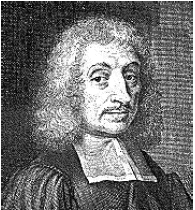The Station takes its inspiration from the life of the pioneering biologist John Ray (1627 – 1705), the founding father of botany and British natural history.
 The
life of John Ray
The
life of John Ray
Based at the University of Cambridge, yet before there was a single laboratory of any kind there, he discovered the monocotyledon-dicotyledon distinction, and catalogued the British flora, based on exact and discriminating observation. He undertook field studies throughout the country even before there were maps to follow, and made order out of botanical chaos. His precise definitions and descriptions of nature had enormous influence on botany and zoology.
However, he was forced to leave his Fellowship post due to the Act of Uniformity by Charles II, and for the remainder of his life he was confined to the backwaters of rural Essex where he cared for his elderly mother and raised his family. Nevertheless from there he continued his research and wrote some of his most celebrated work.
References
Raven, C.E. (1948) John Ray, Naturalist. His Life and Works. Cambridge.
Ray, J. (1660). Catalogus plantarum circa Cantabrigiam nascentium.
Webster, C. (1975) Dictionary of Scientific Biographies. American Council of Learned Societies. Cs. Scribner’s Sons, New York, pp. 313-318.